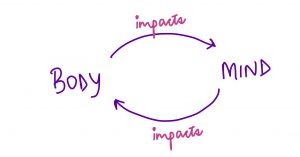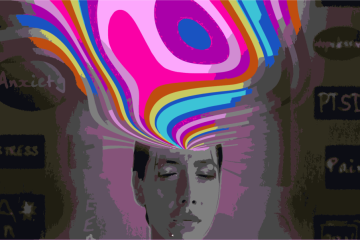Are you conscious? Is an ant? Is a grain of salt?
Why does it matter what consciousness is? Well, for me, it is so fundamental to my existence that I feel I cannot know myself without first having thought about what consciousness is- and where does it come from, and why does it exist, and what does it do (if it does something at all, that is).
When we think of consciousness, most of us think of our complex thoughts and emotions, but then it goes deeper into a sense of ‘self’, an awareness of existing and on and on. It is such a wide spectrum that it makes sense to look at the problem of consciousness in two broad divisions- the easy problem of consciousness and the hard problem of consciousness. These terms were given by philosopher David Chalmers and they help to sort things out pretty well.
The easy problems of consciousness are the phenomena that seem answerable by standard scientific methodology; stuff like studying attention or the difference between being awake and asleep. Neuroscience is progressing towards a deeper knowledge of these brain processes with each passing minute. But it might never form the complete picture.
This is because of the hard problem of consciousness, which essentially questions what is the experience itself? And why do we experience things the way we experience them? How do subjective experiences arise from the physical processes in the brain, and in fact, do they even arise from the brain tissue at all?
This is where it gets pretty interesting.
Currently there are 3 broad theories that are proposed by those that study consciousness –
- Physicalism or materialism
- Dualism
- Panpsychism
Before we start discussing each one, we should define consciousness once. I like the way Annaka Harris describes it as simply as “experience” . You and I are conscious because we are experiencing the world around us. Or as Thomas Nagel puts it- is it something like to be an organism? Is it like something to be you in this moment, reading these words. Is it like something to be the fan on your ceiling? Most people will answer yes to the first question and a resounding no to the second. We’ll explore this more as we go ahead.
Let’s talk about dualism first. Dualism is the view that the mind and body are separate from each other, and that one cannot fully explain the other. According to this view (as professed by the philosopher David Chalmers), apart from the laws of physics, there are also some psychophysicial laws that give rise to consciousness.

Dualists believe that the body gives rise to consciousness, just like a mother gives birth to a baby, and that consciousness itself can impact the physical body. This is where one of the biggest problems in dualism arises- if the mind does impact the body, we should have evidence for it. For ex, when we study human subjects under MRI machines, there should occur phenomena that are unexplained by the simple physical world. There should be ‘gaps’ in our observations, like limbs growing back out of nowhere, or chemistry changing for no apparent reason. Moreover, where do the mind and body come together? Where does a pain signal being transmitted in the neurons get converted to a felt emotion? Does this logic even obey the law on conservation of energy? These questions make dualism seem impractical.
We next move on to materialism, and I believe most of us reading this, including most scientists and philosophers would intuitively agree to this. Materialism is the belief that all of consciousness is a result of the very complex neural processes occurring in the brain. That consciousness will ultimately be understood as being based on the structure and function of the nervous system. This is called a reductionist approach to a problem- that a system can be fully understood by understanding its various parts one at a time. Recent advances (read leaps) in science have been thanks to the onslaught of reductionists, but the reductionist approach at its heart is a very quantitative approach (more about that in a bit.)
The first question that arises when considering materialism is that at what point in time does a bunch of atoms become conscious? Consider a baby in its mother’s womb. It started off as a single cell, rapidly dividing into a cluster of cells called blastocyst, eventually developing a head and a tail end, and then limbs. I am sure none of us would argue that a baby is conscious. So the puzzle is at what stage did that consciousness arrive? Was the blastocyst conscious? Was that initial cell?
Moreover, how does the explanation of the electrical circuitry inside our brain account for the subjective experiences we have? There’s a super famous thought experiment, first described by Frank Jackson, called Mary’s room. In this imaginary construct, Mary is a brilliant neuroscientist who has studied everything there is to study about colors- the hues, warmth, neural pathways that help us perceive color, everything. But she has lived in a black and white room all her life. Having studied all there is to study about colors, she one day steps out of her black and white room, and sees a red apple for the first time.
Would she be able to recognise the color red merely on the basis of all of her knowledge? Most people would agree not. Despite having known all the various quantifications of the color, actually seeing the color would still add to her knowledge a subjective experience that probably no mathematical equation can capture. Is this then a limitation of science?
Thomas Nagel states in his essay What is it Like to Be a Bat that reductionism does not work due to the inherent subjective nature of consciousness, which cannot be studied or characterised by a reductionist approach.
I was absolutely taken aback when Philip Goff, philosopher and author of the book Galileo’s Error (on my reading list) said that science was not made to tackle the question of consciousness. He states how Galileo, who is undoubtedly one of the forefathers of science, said that forget about ‘qualities’ [i.e. subjective/ felt experiences]; they are just in the soul and outside the domains of science; let’s just focus on the quantitative aspects of matter.
Goff also argues that in order to truly have a holistic understanding of the world, we need a post-Galilean science that takes into account not just the quantitative data of observation and experiment, but also the qualitative reality of consciousness that we know from our own individual cases.
So to circle back to our experiences, consider hearing a peacock’s voice for the first time. Science might explain the pitch, amplitude, character of the sound, the fact that it is a mating call to grab the peahen’s attention. But it will not be able to replace the experience of actually hearing a peacock coo for the first time.
There is information missing from any purely quantitative description; and that is information about reality even if it’s an experience. So any complete description of reality must also include the qualitative phenomena, what philosophers refer to as phenomenal properties. Science, at least our present method for it, is inadequate to live up to that benchmark. We fail to account for the intrinsic nature of things. Physics tells us how an electron behaves, but not why it behaves that way.
Stephen Hawking, in his search for “the theory of everything” came to question that, “Even if there is only one possible unified theory, it is just a set of rules and equations. What is it that breathes fire into the equations and makes the universe for them to describe?”
This brings me to the final theory of consciousness –pansychism. Until a few years ago, even considering this theory to be plausible in public would have meant career suicide for scientists and philosophers alike. Panpsychism proposes that consciousness is a fundamental property of matter. Just to recollect, consciousness in nothing but an experience. So maybe every single piece of matter, right from an electron, has consciousness, not in the way of writing poems like humans, but in the sense of it ‘being like something to be an electron’. It seems plausible to believe that consciousness exists in all matter, in a form that is probably unfathomable to our human sensibilities.
Annaka Harris talks about consciousness existing perhaps just like space-time reality. As a fundamental field in the universe, and all matter is merely interacting with that field and manipulating it.
It is a super interesting and awe-inspiring notion, as are the myriad of other aspects surrounding it, but this article is getting too long so I’ll cut it off here for now and leave you with that thought.
I just want to end with a very interesting observation that again Philip Goff made in an interview – if you look at it, neuroscience is really neutral with respect to all the different theories of consciousness (unlike intuitive belief it is not materialistic). Neuroscience simply shows correlation- when so and so happens in your brain, you feel hunger. But why do you feel that hunger? That is where these theories of dualism, materialism, and panpsychism come in. It is something that is definitely fascinating to me, and something I’ll spend nights thinking about.


0 Comments